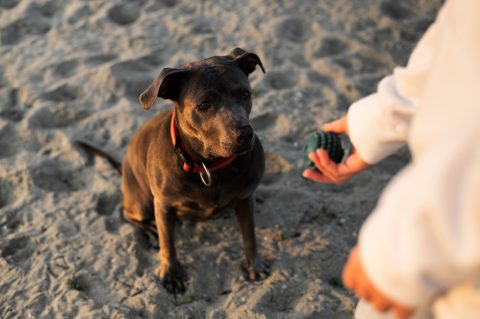Have you ever woken in the small hours, certain an old plumbing pipe was about to burst, only to realize the racket is coming from your dog’s stomach making loud noises right beside the bed? Those absolutely booming gurgles—technically called borborygmi—often send pet parents diving for their phones to Google “why is my dog’s stomach so loud?” The truth is that a canine digestive tract is a busy, muscular tunnel full of churning food, fermenting bacteria, and swirling gases. Every now and then, though, that normal activity cranks the volume button up, and you get a front‑row seat to a private concert you never asked for.
An occasional rumble is perfectly normal, but relentless or unusually intense dog stomach noises can be your pup’s not‑so‑subtle request for help. By understanding what triggers the uproar, you can decide when a simple dietary tweak will quiet the orchestra and when you need to grab the car keys and head for the veterinary ER. Let’s break down the loudest culprits, the red‑flag symptoms, and the preventive steps that keep canine tummies—and households—peacefully silent.
Contents
7 Common Reasons Your Dog’s Stomach Rumbles Like a Drum
1. Excess Gas Has Nowhere to Go
Intestinal gas forms whenever bacteria break down nutrients, but trouble starts when that gas cannot escape fast enough. Picture fizzy soda trapped in a shaken bottle—that same pressure whooshes through intestinal loops, creating the classic soundtrack of dog stomach noises. Speed‑eaters are prime candidates because gulping air adds extra bubbles to the mix. So are dogs fed high‑fat table scraps, cheap kibble packed with indigestible fillers, or a sudden new protein source. Usually the gas either exits as a well‑timed toot or is absorbed with little fanfare. However, if the belly balloons and your dog paces or pants, bloat (gastric dilatation‑volvulus) may be on the horizon. That condition cuts off blood supply within minutes and is quickly fatal without emergency surgery.
2. Food Intolerance or Allergy Is Brewing
When a dog’s immune system decides that chicken, beef, wheat, or another ingredient is an enemy, the gut lining becomes inflamed and leaks fluid. That inflammation speeds motility and whips trapped air into a frothy churn, turning the abdomen into an echo chamber of dog stomach noises. You may notice chronic soft stools, eye‑watering flatulence, or itchy paws and ears. Identifying the offender requires patience: your veterinarian will guide you through an eight‑to‑twelve‑week elimination diet, swapping proteins and carbohydrates in a controlled fashion. Once the trigger food is banished, overall digestion improves, and the rash of late‑night rumbling concerts finally ends.
3. Your Dog Raided the Trash or Snagged Table Scraps
Dogs are opportunistic scavengers; a single stolen chicken wing or greasy pizza crust can start a riot inside the gut. Grease and spice irritate the stomach lining, drawing water into the intestines and sparking violent contractions you hear as dog stomach noises. Most mild indiscretions respond to a brief fast followed by small servings of bland food such as boiled chicken and white rice. However, if vomiting, diarrhea, or refusal to drink accompanies the uproar, your vet may prescribe fluids, anti‑nausea medication, and a gastrointestinal diet to settle the chaos.
4. Intestinal Parasites Have Moved In
Roundworms, whipworms, hookworms, tapeworms—parasites have many names, and all steal nutrients while damaging intestinal walls. The resulting irritation creates sloshing fluid and thick gas pockets, which translate to unmistakable loud stomach noises in dogs. Puppies and rescues are particularly vulnerable because of undeveloped immunity and crowded living conditions. A single fecal exam pinpoints the culprit; modern de‑wormers often clear infestations within days. Preventive monthly heartworm medication (which covers many intestinal worms) plus annual fecal checks ensure unwanted guests never overstay their welcome, and healthy feeding ingredients keep future concerts from ever taking the stage.
5. Viral or Bacterial Infection Is Stirring Trouble
Pathogens such as parvovirus, distemper‑associated enteritis, E. coli, or Salmonella inflame and sometimes ulcerate the lining of the gut. Inflamed tissue leaks serum and blood, which mixes with partially digested meals to create a bubbly cauldron: cue the explosive dog stomach noise. Fever, loss of appetite, and projectile vomiting often follow. Infectious diseases spread rapidly, especially in multi‑dog households or communal areas like dog parks and day‑care centers. Immediate veterinary attention not only speeds your dog’s recovery but also helps protect every canine friend they meet.
6. A Foreign Object Is Blocking Traffic
From tennis balls to baby socks, a curious canine can turn almost any household item into an intestinal roadblock. When swallowed objects lodge in the small intestine, food and gas back up behind the obstruction and slosh with every peristaltic squeeze, producing eerie echoes louder than normal dog stomach noises. Tell‑tale signs include unproductive retching, repeated attempts to vomit, a hard distended belly, and rapidly worsening lethargy. Obstructions require surgical removal or advanced endoscopic retrieval. Waiting “to see if it passes” dramatically lowers survival rates, so head to the emergency clinic at the first suspicion.
7. Chronic Gastrointestinal Disease Is in Play
Some stomach concerts are not one‑time events but a long‑running residency. Disorders such as inflammatory bowel disease (IBD), exocrine pancreatic insufficiency (EPI), irritable bowel syndrome (IBS), or even gastrointestinal cancers keep digestion off‑beat for months or years. Poor absorption means food ferments instead of nourishing, so your dog’s stomach is making loud noises almost daily. Comprehensive diagnostics—blood chemistry, ultrasound, biopsy—help veterinarians craft a management plan that may include prescription diets, probiotics, steroids, or enzyme supplements. With the right protocol, many dogs enjoy “background music” rather than a nightly rock show when properly treated.
When Noisy Guts Require a Trip to the Vet
Not every rumble warrants panic. Yet paired with specific warning signs, even a mild‑sounding intestinal gurgle can signal an emergency. Seek veterinary care as soon as possible if any dog stomach noises accompany:
- Continuous vomiting or diarrhea lasting longer than 24 hours
- Blood, coffee‑ground material, or thick mucus in stool or vomit
- Black, tarry feces that suggest internal bleeding
- Straining to defecate, lack of stool for more than 48 hours, or painful attempts
- Sudden extreme lethargy, collapse, or pale gums
- A tight, drum‑like abdomen, especially if your dog retches without producing anything
- Visible worms or rapid, unexplained weight loss
Early intervention often makes the difference between simple outpatient treatment and costly, invasive surgery—so trust your instincts and call the clinic when in doubt.

Proactive Steps to Keep Your Dog’s Digestive Tract Quiet
Silencing future tummy rumbles starts long before the next midnight wake‑up call. Incorporate these veterinarian‑approved strategies into your daily routine:
- Feed a consistent, high‑quality diet. Sudden switches shock gut flora and spike dog stomach noises; transition gradually over 7–10 days when changes are necessary.
- Use puzzle bowls or slow‑feeders to curb gulping air with meals, especially for barrel‑chested breeds prone to bloat.
- Schedule routine de‑worming according to your vet’s recommendations, even if you do not see worms—larval stages still inflame the gut.
- Keep trash cans secured and high‑fat leftovers well out of reach. Prevention beats treatment (and upholstery cleaning) every time.
- Exercise daily but avoid vigorous play right after meals. Gentle walks aid motility; sprints on a full stomach increase torsion risk.
- Add probiotic supplements or fermented foods formulated for pets to support balanced intestinal bacteria and reduce excessive gas.
- Book regular wellness exams. Annual bloodwork can detect chronic issues like EPI or early kidney disease before the soundtrack turns up the volume.

Conclusion
An audible gut is your dog’s built‑in PA system: sometimes it simply announces healthy digestion; other times it pleads for help. By recognizing why a dog’s stomach is making loud noises, monitoring associated symptoms, and acting promptly, you safeguard both comfort and longevity. The payoff is a quieter household, a happier pup, and far fewer late‑night online searches for “how to stop dog stomach noises fast.”
Stay observant and stay calm.







